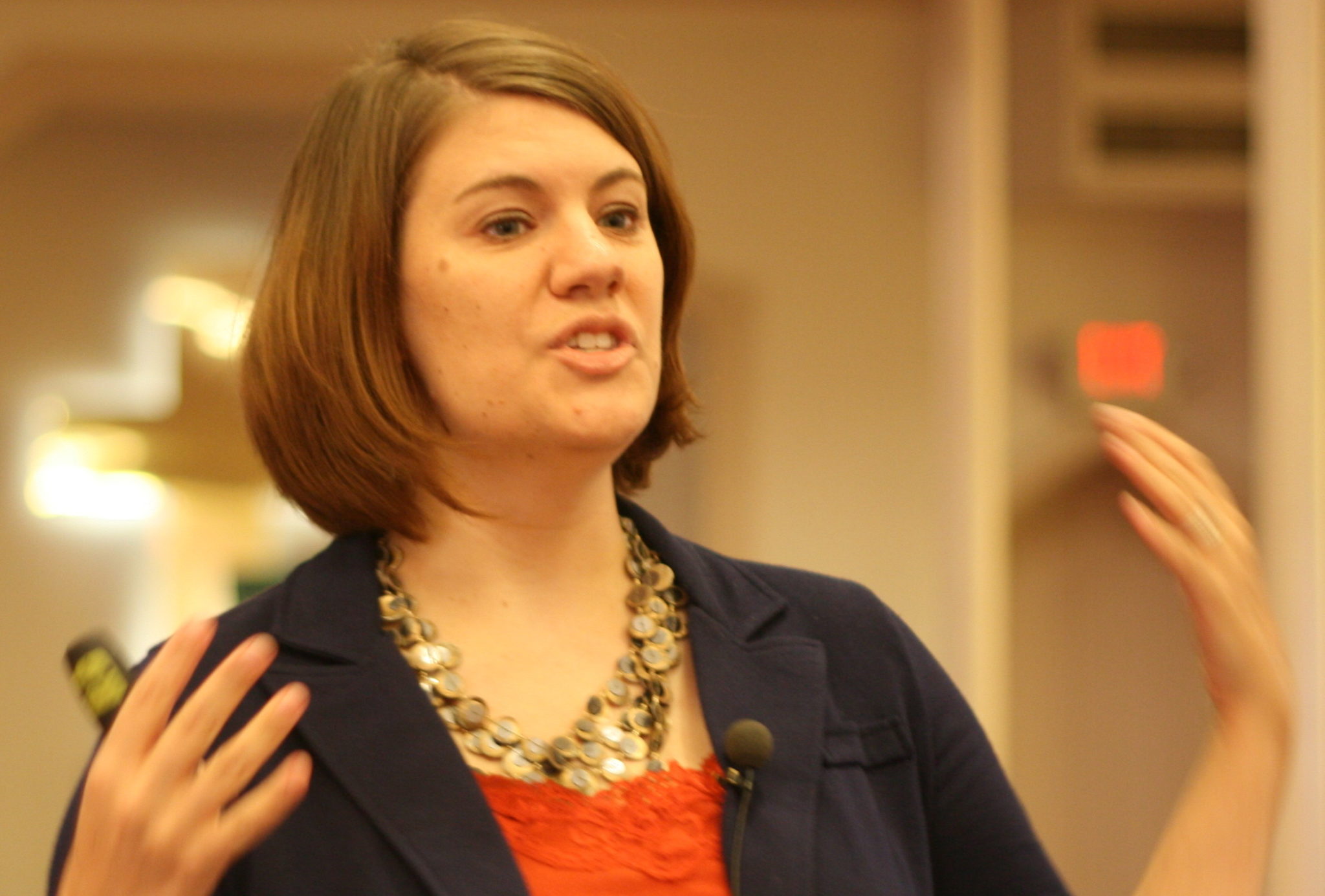By Bob Allen
Both praised and scorned for her take on controversial topics such as Christians and evolution and gender roles for husbands and wives, author Rachel Held Evans has rapidly become an expert in dealing with criticism.
“As an author and blogger, I’m subjected to a lot of criticism,” Evans said Oct. 18 at a retreat for young leaders involved in the Cooperative Baptist Fellowship. “In this world we live in now, when you’re criticized, often you’re criticized publicly and for all the world to see.”
In the middle of a whirlwind tour promoting a new book that includes a scheduled appearance Monday on NBC’s Today show, Evans paused two days in Georgetown, Ky., to lead a retreat sponsored by the Kentucky Baptist Fellowship for members of Current, a network of young adults invested in the Cooperative Baptist Fellowship.
 The author of the 2010 book Evolving in Monkey Town by Zondervan and soon-to-be-released A Year of Biblical Womanhood by Thomas Nelson, Evans said authors aren’t alone in dealing with unhappy people, something she suspects ministers already know.
The author of the 2010 book Evolving in Monkey Town by Zondervan and soon-to-be-released A Year of Biblical Womanhood by Thomas Nelson, Evans said authors aren’t alone in dealing with unhappy people, something she suspects ministers already know.
“If you do anything at all interesting in your life, it is inevitable that you will face criticism, and in our highly connected world, these criticisms are often public,” she said.
Evans said everywhere she speaks someone asks her how she deals with criticism. A list of adjectives currently floating around the Internet refer to her with terms like “false teacher,” “diva,” “shrill,” “femi-Nazi” and “Jezebel.”
“The reality is, I actually kind of suck at it,” she said. “I’ve never been great at taking criticism.” Four-time winner of the annual “best Christian attitude” award at the private Christian school she attended while growing up in Dayton, Tenn., “I always liked to hear people praise me, so negative things really tend to tear me down.”
As a result, Evans said, she has had to develop strategies to avoid becoming calloused, heeding advice from her husband: “Don’t ever lose your tender heart, because then you wouldn’t be Rachel anymore.”
Evans offered the following tips for “growing a thick skin while keeping a tender heart.”
— Wait. Breathe. Unclench your fists: Evans said the first reaction when criticized is to fight back and be defensive, even when the criticism is constructive. She said she doesn’t respond to critical e-mails immediately until after she’s had time to cool off. It’s harder to do that face-to-face, she said, but in those situations a minister might suggest that the confrontation is a lot to process and suggest discussing it calmly at a later time.
— Nurture a gentle and quiet spirit: Evans said people often confuse gentleness with passivity, but the root meaning of the term has more to do with self-control. “Gentleness at its heart is not about being unmoved or passionless,” she said. “Gentleness is about having enough self-control that you can manage your passion.”
— Engage the positive: In blogging, Evans said, there’s an expression “don’t feed the trolls,” people who leave comments that are off-topic and don’t offer anything constructive. Inevitably, she said, other comments will engage that individual and steer the conversation off on a tangent. “There’s this tendency we have to always focus on the negative,” she said. “If I get 200 comments and 199 are positive, I will go to bed thinking about the negative comment.”
— Keep an open mind: “The criticism that really gets under my skin are often the criticisms that I think must have a grain of truth or tack on to insecurity,” Evans said. For example, she is bothered more when someone says she is a poor writer than that in their opinion she is going to hell. Such criticism can be constructive, she said, because it’s an opportunity to work on the insecurity. When criticism is constructive, she said, it is her practice to respond, even if it means admitting that she was wrong.
— Keep a tender heart: “If you shut down that part of yourself that feels hurt in order to protect yourself from being hurt, you also shut down that part that is capable of love,” Evans said. “Probably the most effective follower of Jesus is someone who has a thick skin and a tender heart, someone who shows both strength and compassion. Those two things are not mutually exclusive.”
— Disarm your critics with radical kindness: Evans said Jesus’ admonition to “turn the other cheek” is not passivity. “If you get slapped, you have to turn and face the person that slapped you,” she said. “It’s not passivity, but it’s also not violence. It’s not retribution. It’s a third disarming way.”
Current is a network that connects ministers, church leaders and divinity students under 40 who are involved with the Atlanta-based Cooperative Baptist Fellowship. Kentucky Baptist Fellowship associate coordinator Joshua Speight said last year the state affiliate decided to do something to attract young people and planned a retreat led by Washington, D.C., pastor and Associated Baptist Press columnist Amy Butler.
Planning for the second annual retreat this year, Speight said, Evans’ name surfaced early as a possible speaker, because many of the retreat participants follow her blog. “We just took a shot,” he said about offering the invitation. “We did not realize the timing would work out so well.”
Co-sponsors of the event included Georgetown College, Baptist Seminary of Kentucky, Kentucky Baptist Women in Ministry and Passport.
Evans welcomed the opportunity as “a quiet before the storm.”
“The timing was perfect,” she said. “This has been a time of refreshment for me when otherwise it would have been really crazy.”
